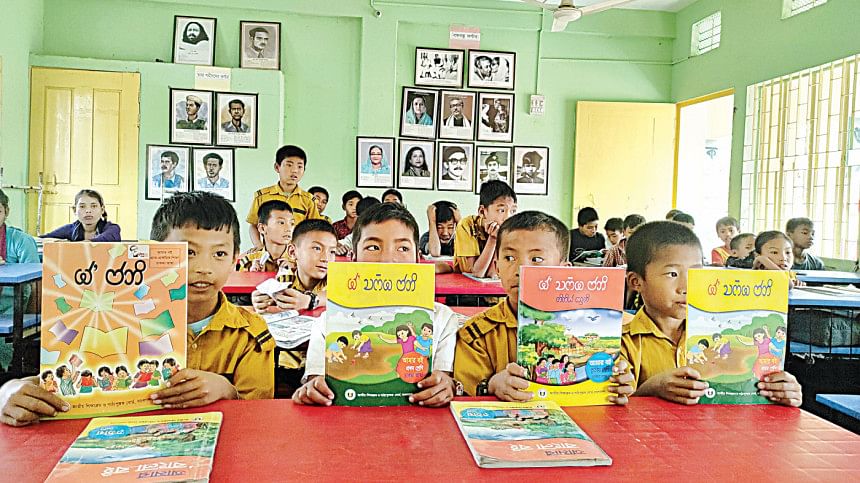An empty promise; of books without teachers

The Chittagong Hill Tracts Peace Accords of 1997 promised primary education in the mother tongue for indigenous children. In response, the Bangladeshi government implemented a national education policy in 2010. This policy initially brought hope to parents of indigenous communities, as textbooks for five indigenous communities -- Chakma, Marma, Tripura, Garo, and Sadri -- were designed and distributed across schools in 2017 as part of the project.
However, seven years later, the initiative seems to have faltered. The core issue lies with the lack of trained teachers. Many teachers haven't received proper training to use the curriculum, hindering their ability to teach effectively. Due to the absence of available scriptures, the teachers find it difficult to read the books, let alone teach them.
This negligence extends to the exclusion of these subjects from regular class schedules and student evaluations.
As a result, children are losing interest in their mother tongue, putting these languages at risk of disappearing.
Visiting various primary schools in Rangamati recently, this correspondent found many of those are yet to initiate education in their mother tongue due to not having expert teachers.
"The training was not enough. Moreover, the subject is only taught during free hours like recess or tiffin breaks. Thus, students are not interested in learning it as it adds to their academic burden but has no impact on their grades," she added.
"Despite speaking Chakma language, I find it difficult to teach it to someone as I haven't gotten any training," said Monika Chakma, assistant teacher at Kutukchhari Govt Primary School in the district.
The only training Monika had received was about four years ago, and that too only for seven days.
"The training was not enough. Moreover, the subject is only taught during free hours like recess or tiffin breaks. Thus, students are not interested in learning it as it adds to their academic burden but has no impact on their grades," she added.
Echoing Monika, David Chakma, head teacher of Shukarchhari Govt Primary School in the same upazila, said, "Growing up, we learned our language orally. We had only heard of the existence of its alphabets but were never really introduced to them."
He urged the authorities concerned to design extensive training modules to reap positive results in this regard.
Meanwhile, Bhuatolichhara Govt Primary School under Jurachhari upazila has been unable to conduct classes in mother tongue as they have no teachers.
"Being the only teacher in this school, I can only teach the Pangkhua community students as I don't speak the other languages," said the school's assistant teacher Lalpar Pangkhua. While Lalpar knows the language orally, he cannot write it properly.
"Though we receive books every year, we are unable to put them to use as we have not been formally trained," he added.
Expressing dissatisfaction over the implementation process and impact, Pohela Chakma, mother of a student at Chhoto Rani Primary School in Sadar upazila, said, "How can teachers, who do not know alphabets, teach children the language?"
Rangamati District Council chairman Aong Sui Prue Chowdhury said they have done their best to train teachers. "Our resources are limited," he added.
Rishikesh Sil, primary education officer in Rangamati, said, "Assigned teachers were provided training in 2017, followed by other sessions by the Primary Teachers Training Institute. However, it has not been enough."
The district council allotted a budget for training sessions last year. Its implementation process, however, is still underway, he added.

 For all latest news, follow The Daily Star's Google News channel.
For all latest news, follow The Daily Star's Google News channel. 



Comments